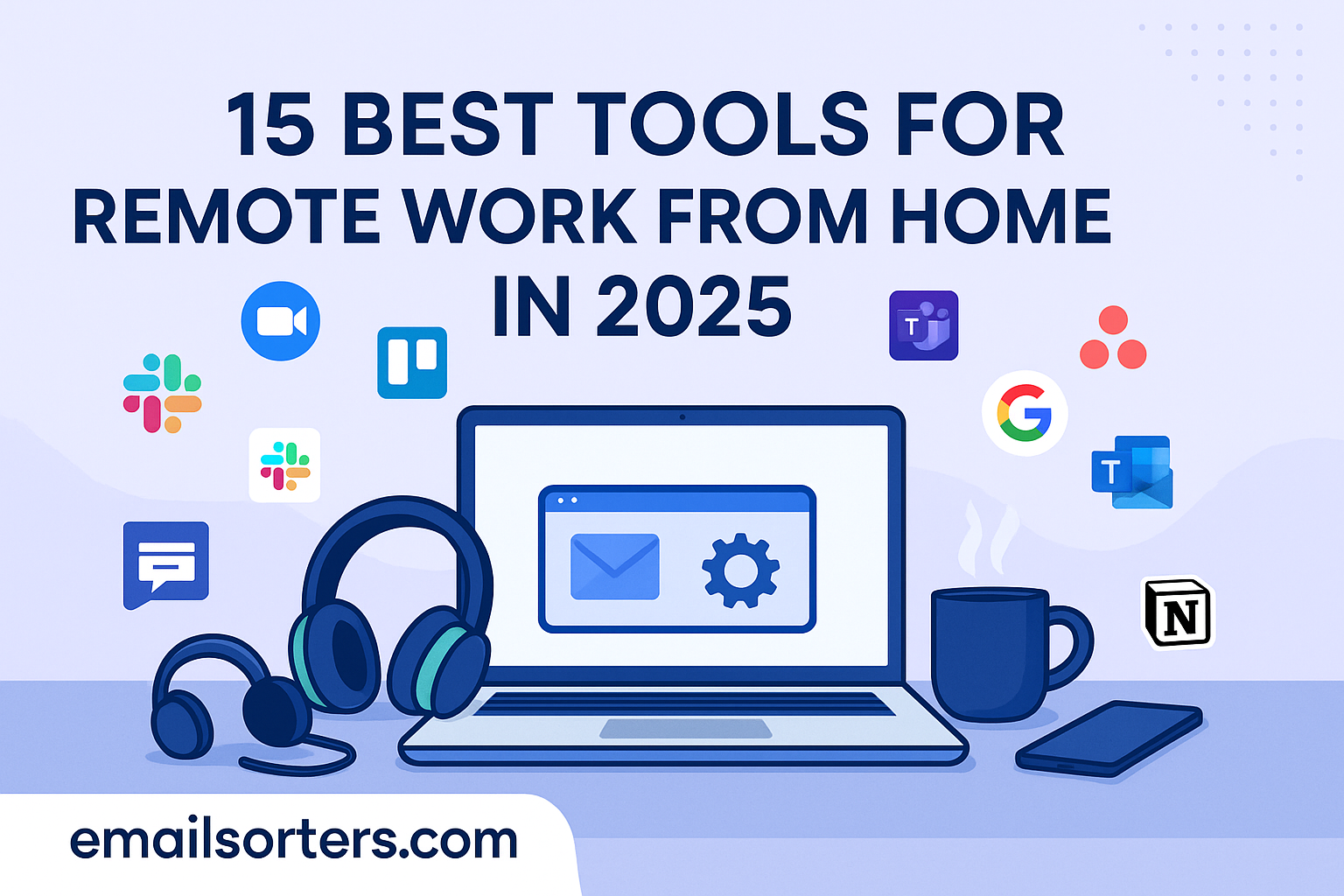Finding the best tools for remote work can feel like hunting for Wi-Fi in the middle of nowhere. There are so many apps out there, some help, some confuse, and some just sit there eating up space.
So, which ones are actually worth it in 2025?
Whether you’re working from home full-time, freelancing, or just juggling a hybrid schedule, the right tools can save your time, sanity, and maybe even your keyboard from rage-typing.
In this guide, we’ve rounded up 15 remote work tools that actually make work work, from communication and project management to time tracking and focus hacks.
Why the Right Tools Matter for Remote Work
Remote work offers freedom, but it also brings unique challenges. Distractions at home, communication gaps, and lack of structure can all reduce productivity. The best tools for remote work solve these problems by streamlining workflows, improving collaboration, and keeping your data secure. With the right work from home software, you can manage projects, communicate clearly, track your time, and keep everything organized. These remote team apps are essential for anyone who wants to thrive outside the traditional office.
The 15 Best Tools for Remote Work in 2025
Working from home is easier with the right tools. In 2025, new apps and updates make remote work faster, safer, and more organised. Here are the top tools that help you stay productive and connected from anywhere.
1. Slack – Real-Time Team Communication
Slack is at the heart of many remote teams. It offers channels for focused discussions, direct messaging, and integrates with thousands of other apps. In 2025, Slack’s AI features summarize threads, prioritize urgent messages, and translate conversations for global teams. Its notification controls help you protect your focus time, while its robust search makes finding information easy. Slack stands out as a remote team app that keeps everyone connected and informed.
2. Zoom – Video Conferencing & Virtual Presence
Zoom remains a leader in video meetings, offering reliable video calls, webinars, and virtual events. The 2025 version includes spatial audio, AR-enabled meeting rooms, and AI-powered meeting summaries. Zoom’s immersive features make virtual collaboration feel more human, and its integrations with scheduling and file-sharing tools make it a staple for distributed teams.
3. Asana – Project Management Powerhouse
Asana helps remote teams organize projects, assign tasks, and track progress. Its visual timelines, custom rules, and reporting features keep everyone aligned. Asana’s automation tools reduce manual work, while its integrations with communication and file storage apps make it a central hub for remote productivity.
4. Trello – Visual Task Management
Trello uses Kanban boards to help you organize tasks visually. Its AI-powered suggestions and automation features make workflow management intuitive. Trello is ideal for freelancers and teams who want a simple, flexible way to track projects and deadlines. Its integrations with Slack and Google Drive enhance its utility.
5. ClickUp – All-in-One Productivity Platform
ClickUp combines task management, document collaboration, goal tracking, and automation in one platform. Its AI engine helps with smart task assignments and workflow automation. ClickUp’s dashboards and reporting tools make it easy to monitor progress, making it a favorite among remote teams managing complex projects.
6. Microsoft Teams – Unified Communication & Collaboration
Microsoft Teams offers chat, video meetings, file sharing, and project management in one place. Its tight integration with Office 365 makes it a natural choice for businesses already using Microsoft products. Teams supports real-time document collaboration, meeting recordings, and custom apps, making it a comprehensive remote work solution.
7. Google Workspace – Cloud-Based Office Suite
Google Workspace provides email, calendar, document editing, and cloud storage. Its real-time collaboration features allow multiple users to work on the same document simultaneously. AI-powered tools help with scheduling, writing, and data analysis. Google Workspace is essential for teams that need reliable, accessible work from home software.
8. Notion – Knowledge Management & Documentation
Notion is a flexible workspace for notes, wikis, and project management. Its AI-powered features generate documentation, summarize notes, and build knowledge graphs. Notion is perfect for remote teams who need a central place to store and share information. Its database and chat integrations streamline internal communication.
9. Hubstaff – Time Tracking & Productivity Monitoring
Hubstaff is a top choice for tracking time, monitoring productivity, and managing remote teams. It offers online timesheets, project tracking, and even GPS location for field teams. Hubstaff’s reporting tools help managers understand how time is spent and identify productivity trends. Its payroll and expense tracking features make it a complete workforce management solution.
10. Miro – Online Whiteboard for Collaboration
Miro is an interactive whiteboard platform for brainstorming, planning, and visual collaboration. It supports sticky notes, diagrams, and mind maps, making it ideal for creative teams. Miro’s integrations with project management and communication tools help remote teams collaborate visually, even when miles apart.
11. Zapier – Workflow Automation
Zapier connects your favorite apps and automates repetitive tasks. With over 7,000 integrations, you can create “Zaps” that move data, send notifications, or trigger actions across platforms. Zapier saves time by eliminating manual work and keeping your tools in sync. For more on workflow automation, see the best remote work tools overview on Zapier.
12. Loom – Video Messaging for Async Communication
Loom lets you record quick video messages to explain ideas, share feedback, or onboard new team members. It’s faster than typing long emails and helps add a personal touch to remote communication. Loom is especially useful for asynchronous teams working across time zones.
13. PureVPN – Security for Remote Work
PureVPN protects your online activity with military-grade encryption and a strict no-log policy. Its split tunneling feature allows you to route specific traffic through the VPN, keeping sensitive work data secure while maintaining fast local connections. PureVPN is essential for anyone handling confidential information from home.
14. Any.do – Task & Life Management
Any.do blends work and personal tasks in a single, easy-to-use app. Its cross-platform sync, voice entry, and minimalist design help remote workers stay organized. Any.do is ideal for freelancers and anyone balancing multiple projects or responsibilities.
15. We360.ai – Employee Performance Analytics
We360.ai provides real-time insights into employee productivity and engagement. Its customizable reports and monitoring tools help managers identify strengths, address bottlenecks, and keep remote teams motivated. We360.ai is especially useful for organizations looking to optimize remote workflows and performance.
Categories of Remote Productivity Tools
Remote work tools come in different categories, each serving a key purpose. From communication and task management to security and automation, understanding these categories helps you build a toolkit that keeps your workflow smooth and efficient.
Communication & Collaboration
Effective communication is the foundation of remote work. Tools like Slack, Microsoft Teams, and Zoom ensure that teams stay connected, share updates, and collaborate in real time. These remote team apps reduce email overload and create a central hub for discussions and decisions.
Project & Task Management
Managing projects remotely requires structure and transparency. Asana, Trello, and ClickUp offer visual boards, timelines, and automation features to keep everyone on the same page. These work from home software solutions make it easy to assign tasks, set deadlines, and track progress.
Time Tracking & Productivity
Time tracking tools like Hubstaff and We360.ai help remote workers and managers understand how time is spent. They provide insights into productivity trends and help ensure that projects stay on schedule. These tools are especially valuable for freelancers and distributed teams.
File Storage & Knowledge Management
Cloud-based platforms like Google Workspace and Notion make storing, sharing, and collaborating on documents effortless. They ensure that everyone has access to the latest files and information, no matter where they are working from.
Security
Security is critical for remote work. PureVPN and similar tools protect sensitive data and ensure safe internet connections. Multi-factor authentication and encrypted storage are standard features in the best tools for remote work.
Workflow Automation
Automation platforms like Zapier eliminate repetitive tasks and keep your tools connected. By automating workflows, remote workers can focus on higher-value activities and reduce errors. For more on this, check out Zapier’s guide to the best remote work tools.
Specialized Tools for Different Needs
Not all productivity tools serve the same purpose. Depending on your role, goals, and workflow, specialized apps can solve unique challenges. From email management to mobile productivity, these tools help you work smarter, wherever you are.
Email Productivity
Managing email efficiently is crucial for remote workers. Explore the best email manager apps to organize your inbox and boost productivity with features like smart sorting, scheduling, and integrations. For more tips, see email hacks for better inbox control and productivity.
Broader Productivity Apps
A well-organized digital workspace can make a huge difference in remote work. Discover top organization apps for better productivity, offering tools for note-taking, calendar management, and habit tracking.
Mobile Productivity
Many remote workers rely on mobile devices. The best Android productivity apps for work and life ensure you stay productive on the go, offering mobile versions of popular tools and unique apps for time management and focus.
Small Business Solutions
For small businesses operating remotely, the right email and communication tools can make or break daily productivity. Gmail alternatives tailored for remote teams often come with built-in collaboration features, secure file sharing, calendar integration, and task management, all essential for staying connected and organized while working from home. These platforms also support custom domains, giving small businesses a professional look without the overhead of traditional office setups.
Trends in Remote Work Software
The remote work landscape is evolving rapidly. AI-powered features, immersive virtual workspaces, and seamless integrations are now standard in the best tools for remote work. Companies are investing in solutions that enable asynchronous collaboration, automate routine tasks, and support employee well-being. For a broader industry overview, see best remote work tools.
How to Choose the Right Remote Work Tools
When selecting work from home software, consider your team size, workflow complexity, and security needs. Look for tools that offer integrations, automation, and mobile access. Balance free and paid options to match your budget. Test different remote productivity tools to find the right fit for your workflow.
Conclusion
Remote work is here to stay, and the best tools for remote work are essential for staying productive, organized, and secure. From communication and project management to time tracking and automation, these 15 remote team apps will help you thrive in 2025—no matter where you work. Explore, experiment, and build your ideal remote toolkit for a more efficient and enjoyable work-from-home experience.




